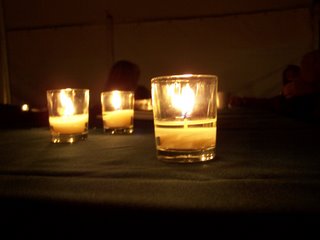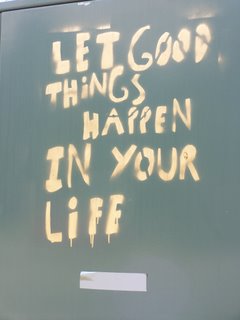
Since I have been immersed in poetry (and photography, but that's another blog) lately, writing and reading, I thought I would drag the rest of you through some of my world. I have, however, kept this blog on a theme, unfortunately one that just doesn't seem to go away.
Being a miliant free verse poet (I
can - if I
want to - write in form, sonnets even cinquains mostly - oh will she
start speaking
english!) I will not subject you to anything too old fashioned, or
"deep".
Back to Babylon
by Viggo Mortensen
Accept and forget difference or desire that separates and leaves us longing or repelled. Why briefly return to play in broken places, to mock the ground, to collect infant shards, coins, fossils, or the familiar empty canisters and casings that glint from poisoned roots in the blackened dust? We make bad ghosts, and are last to know or believe we too will fade, just as our acrid sm oke and those strange flakes of skin and strands of hair will, into largely undocumented extinction. Lie down, lie down; sleep is the best thing for being awake. Do as we've always been told and done, no backward glances or second thoughts, leaving sad markers buried in the sand. Sleep now, dream of children with their heads still on, of grandmothers unburdening clotheslines at twilight, of full kettles slow-ticking over twig embers. Ignore boneless, nameless victims that venture out on bitter gravel to claim remains while we rest.
oke and those strange flakes of skin and strands of hair will, into largely undocumented extinction. Lie down, lie down; sleep is the best thing for being awake. Do as we've always been told and done, no backward glances or second thoughts, leaving sad markers buried in the sand. Sleep now, dream of children with their heads still on, of grandmothers unburdening clotheslines at twilight, of full kettles slow-ticking over twig embers. Ignore boneless, nameless victims that venture out on bitter gravel to claim remains while we rest.
Pay at the window for re-heated, prejudiced incantations. Take them home and enjoy with wide-screen, half-digested, replayed previews of solemn national celebration. Then sleep, by all means; we'll need all the energy we can muster for compiling this generation's abridged anthology of official war stories, highlights of heedless slaughter, to burnish our long and proud imperial tradition. At some point, by virtue of accidentally seeing and listening, we may find ourselves participating in our own rendering. Few of our prey will be left alive enough to water the sun with their modest, time-rubbed repetitions, to rephrase their particular, unifying laws. Our version of events has already made its money back in foreign distribution and pre-sales; all victory deadlines must be met.
It can get so quiet, with or without the dead watching our constant deployments. From our tilted promontory we may see one last woman scuffle away across cracked parchment of dry wash beneath us, muttering to herself—or is she singing at us?—as she rounds the sheared granite face and disappears into a grove of spindly, trembling tamarisk shadows lining the main road. We'll soon hear little other than our breathing, as shale cools and bats rise to feed, taking over from sated swallows. Night anywhere is home, darkness a cue for turning inward, quiet an invitation to review our expensive successes before morning extraction from the twin rivers of our common cradle.
This poem was inspired by a book of photographs of the bombings of Hiroshima and Nagasaki. One of the photos was of the white shadow, or silhouette, on a wall of a victim of one of the bombings.
Shadow on a Wallby Seymour Joseph
On a bright morning in August I was thinking of fish when the sun exploded.
I was thinking of fish when the sun exploded.
Takeo told me the market had fresh mackerel
and I was rushing to buy some.
But when I turned the corner it happened,
The thought of mackerel baked on coals
in my mind,
A mouth of white heat swallowed me.
But you can see me still on the wall
near the corner
Where I turned toward the market —
My shadow, left like a ransom note saying,
"I took Toshiro Fujima today,
this moment, right here,
melted his flesh in a single stroke."
My shadow stays behind to mark the place
Like an eaten fish you know by the bones
on the plate.
It's me as I walked on an August morning
With the thought of fresh fish and the touch
of a breeze from the river.
There at the end of all things,
when time was stopped,
I am recorded on a wall.
and this last one I actually have on a Poetry Slam CD set (yes I even listen to it in the car - there is no end to the nerdiness) it is written by a man who is against war, but has served. He is a brillant poet.
A Lesson from the Corps
by Marvin Bell
When you find the body, it has cauliflower ears.
It stinks of dead worms, the blood crumbles
between your fingers.
When you find the body, the sleeves of the combat
fatigues are in shreds.
Its face is puce, its torso black and blue, its
guts purple, but the teeth still gleam, and
the bones will shine up when cleaned.
Your saliva congeals, you taste dried paste.
Later, you may feel shame for noticing the colors
or hating the smell.
You were schooled to do this.
To yank the dog tag off with a snap.
You were trained not to answer back to the
silence.
There is a hiss as you compel the metal tag
between the teeth.
This day may become a whiteout, a glare, a deficit
in memory.
A place too barren even for a shriek.
A picture that didn’t develop, just a clear
negative.
For nothing recorded the thump of the bullet as it
hit, nor the webbing wet inside his helmet
liner, nor the echoing within the helmet
itself.
But you may think you remember the shudder you
didn’t see when he died.
You may imagine the last word, the mouth before
the lingering stare.
The machinery of his broken chest may appear in
dreams.
You may see the eyes, and hear the last expulsion
of air.
He is the vault now for your questions to God.
Only the dead can tell you the distance from here
to there.
Personally I haven't written much antiwar poetry - I'm just not so good at big political statements, in or out of poems, that's why I'm always hiding behind other's words, because they usually say what I feel, but so much better than I could say it.
So kudos to those brillant bloggers, and equally brillant poets. Keep it up.



 oke and those strange flakes of skin and strands of hair will, into largely undocumented extinction. Lie down, lie down; sleep is the best thing for being awake. Do as we've always been told and done, no backward glances or second thoughts, leaving sad markers buried in the sand. Sleep now, dream of children with their heads still on, of grandmothers unburdening clotheslines at twilight, of full kettles slow-ticking over twig embers. Ignore boneless, nameless victims that venture out on bitter gravel to claim remains while we rest.
oke and those strange flakes of skin and strands of hair will, into largely undocumented extinction. Lie down, lie down; sleep is the best thing for being awake. Do as we've always been told and done, no backward glances or second thoughts, leaving sad markers buried in the sand. Sleep now, dream of children with their heads still on, of grandmothers unburdening clotheslines at twilight, of full kettles slow-ticking over twig embers. Ignore boneless, nameless victims that venture out on bitter gravel to claim remains while we rest. 